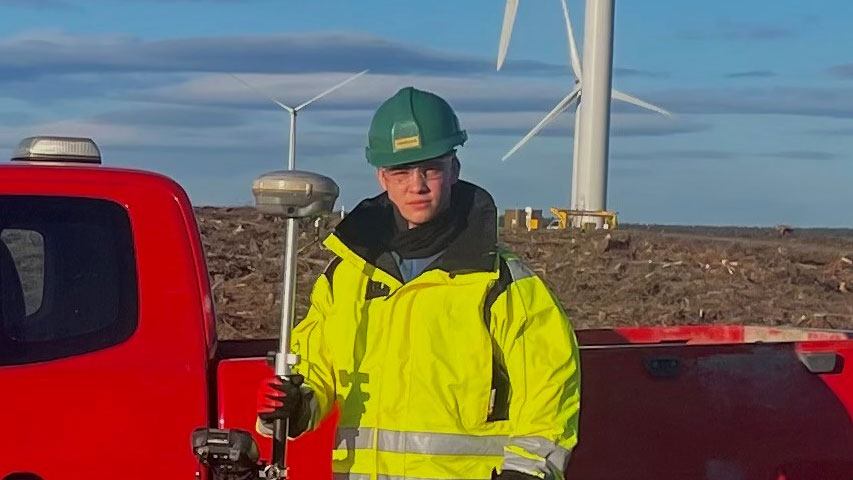Farrans Construction

In this case study we hear from John Casey of Farrans. John is a GA student on our BEng (Hons) Civil Engineering programme.
We also hear from John's mentor, Luis Alves, on the importance of graduate apprenticeships at Farrans.
John Casey, Graduate Apprentice at Farrans
Please explain how you found the graduate position and give some background as to what you were doing prior to being offered the graduate apprenticeship position.
I was awarded an A in HNC at Glasgow Kelvin College. Apprenticeship employment gave me options to improve my knowledge and understanding of Civil Engineering. I chose this program because it suited my development needs.
What were the benefits of the graduate apprenticeship programme that attracted you the most?
The biggest benefit was the balance between work-based learning and campus-based learning.
Please describe what you are employed to do and how you have coped with the challenges of learning new skills whilst studying towards a degree.
My roles can change throughout the projects I'm working on depending on what the work challenges are. Generally speaking my main duties are:
- Ensuring surveys/setting out is done, making sure there is minimum error in crucial activities in the project.
- Supervising sub-contractors on site making sure all Health & Safety is being adhered to and they are doing what they are contracted to do.
- Under the eye of my mentor, reviewing RAMS correctly and making sure workers have been briefed on these to ensure not just their safety but everyone on sites.
What is your proudest achievement to date in your role and can you explain how this impacted on your working environment and or helped deliver results on behalf of your organisation?
I started working on my first Civil Engineering project when I was 17 years old and was part of the team who successfully completed it 3 years later. This helped me develop as a young engineer and gain more confidence dealing with contract/project challenges.
What are your future career hopes and goals on completion of the graduate apprenticeship? Please explain how you think this will differ if you had gone via the traditional route of achieving a degree via a full-time undergraduate programme.
I want to continue to develop as an engineer and assert myself as a crucial member of the Farrans' team. This route gives me experience and a degree which stands me out from a fresh graduate with just a degree.
Can you outline what support and/or encouragement your employer has given you in your GA journey?
- Freedom to grow as an engineer and be confident in my own abilities.
- Experience that is crucial for my development.
- The skill to adapt from working / University and use skills gained switching over between both
How would you sum up your GA experience so far?
Your talent determines what you can do. Your motivation determines how much you're willing to do. Your attitude determines how well you do it.
Luis Alves, workplace mentor at Farrans
Can you provide some background to the company?
Farrans Construction is an established building and civil engineering contractor with operational interests throughout the UK and Ireland. We are part of the CRH family which employs approximately 70,000 people globally, with a Farrans' turnover of approx. £250million.
We operate in the following sectors; Renewables, Marine, Transportation, Education, Healthcare, Residential, Water & Wastewater. Our head office is based in Northern Ireland with regional offices in London and Edinburgh, employing over 570 people.
Why did the company decide to go down the graduate apprenticeship route?
Traditionally and like many companies in the construction industry, we hired graduates, and any apprenticeships were Level 2 and Level 3. We were pigeon–holed into a graduate culture. I'm delighted that, as a company, we have woken up to graduate apprenticeships.
Farrans are keen to build new talent pipelines and create more opportunities for people to have employment and continue their education.
What are the key reasons why the graduate apprenticeship model suits your specific business/industry?
At Farrans, there is a marked difference in staff turnover between graduates and apprentices. We have less of a churn with our apprentices. We find that apprentices can be aligned in such a way that they very quickly become part and parcel of the organisation.
They have a greater sense of belonging and become a value–adding employee much faster than graduates. From a CSR perspective, we feel like we are giving back to the community, giving young people an option that allows them a degree without the debt, giving back to the economy and addressing the skills gap in the UK.
What appealed to you most about Heriot-Watt University as the GA provider?
Farrans has been based in Scotland for nearly 80 years. We are keen to build relationships with the local universities to not only bring on apprentices but also placements and graduates, offering employment to the people in the community.
In what way has the candidate made a contribution to the workplace / business?
John was employed by Farrans due to commencing his GA. It was the right move for him to ensure he got the qualification for the role he was interested in. Through the GA John can continue to work and earn a wage while attending Heriot Watt to gain his Civil Engineering degree debt free, it's a win / win for everyone.
John will continue to grow from strength to strength. He has the determination to succeed in his career and we will be there to support him in every way possible. John has a bright future ahead.
Based on your experience of the graduate apprenticeship programme would you happily employ another graduate apprentice in the future?
Farrans currently employ 15 apprentices throughout the UK and we aim to more than double that by the end of 2021.